#gregoria oryang de jesus
Photo


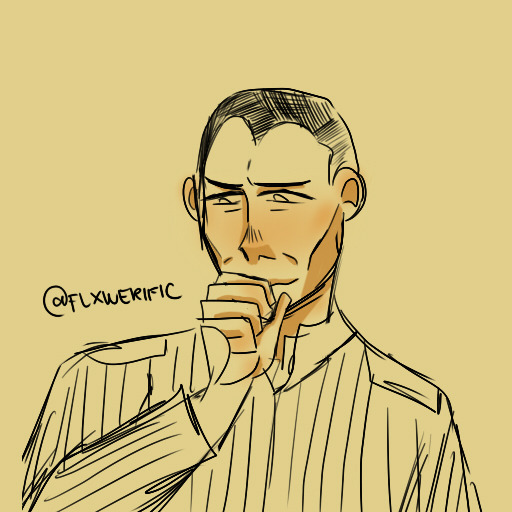
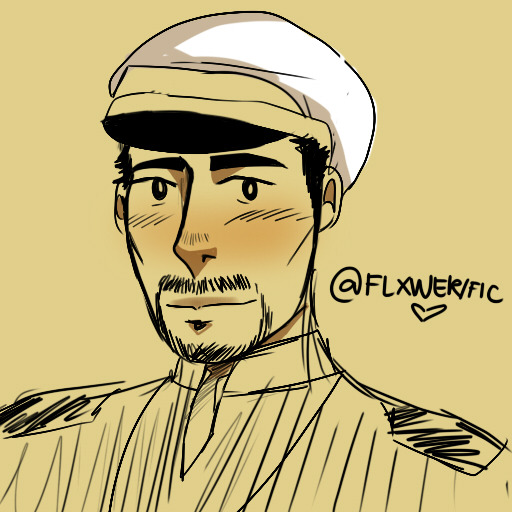


doodles from Twitter!
#heneral luna#heneral moon#goyo: ang batang heneral#joven hernando#marcelo h del pilar#jose alejandrino#manuel bernal#jose bernal#angel bernal#anghelito#andres bonifacio#gregoria oryang de jesus#doodles#sketches
17 notes
·
View notes
Text

Sa ilalim ng pulang bandila, tayong dalawa'y nanumpa...
11 notes
·
View notes
Photo
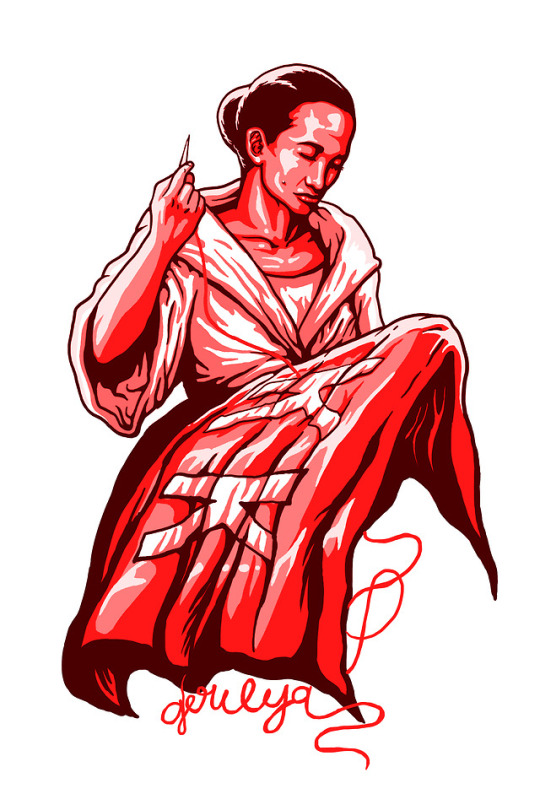
ORYANG
Sticker Art by Gerilya
2018
28 notes
·
View notes
Text
Mula Giliw, Nang Pumanaw Ka
a poem by Gregoria de Jesus written after the event by his widow, Gregoria de Jesus. It's a heartfelt lament, and a telling testimony of the depth of their love and their relationship.
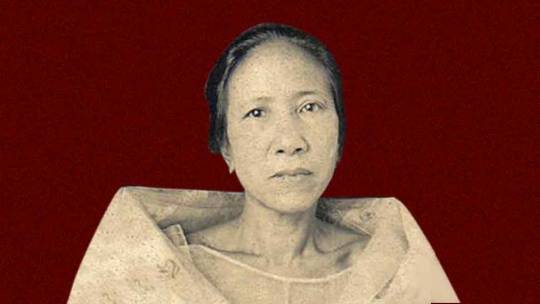
Magmula, giliw, nang ikaw ay pumanaw,
Katawan at puso ko'y walang paglagyan;
Lakad ng dugo sa ugat ay madalang,
Lalo't magunita ang iyong palayaw.
Lubhang malabis ang aking pagdaramdam
Sa biglang paggayak mo't ako'y panawan,
Alaala ko sa 'yong pagdaraanan,
At gayundin naman sa iyong katawan.
Na baka sakaling ikaw ay kapusin,
Lumipas sa iyo oras ng pagkain;
Sakit na mabigat baka ka sumpungin
Na lagi mo na lamang sa aki'y daing.
Saan patutungo yaring kalagayan,
Dalamhating lubos liit ng katawan,
Magsaya't kumain hindi mapalagay,
Maupo't tumindig, alaala'y ikaw.
Kalakip ang wikang "magtiis, katawan,
Di pa nalulubos sa iyo ang layaw,
Bagong lalaganap ang kaginhawaan
Ay biglang nag-isip na ikaw ay iwan."
At kung gumabi na, banig ay ihiga,
Matang nag-aantok pipikit na bigla,
Sa pagkahimbing panaginip ka, sinta
Sabay balong nang di mapigil na luha.
Sa pagkaumaga, marahang titindig,
Tutop ng kamay yaring pusong masakit,
Tuloy na dungawan, kasabay ang silip,
Sa paroonan mong hirap ay mahigpit.
Matapos sumilip, pagdaka'y lalabas,
Sa dulang kakanan at agad haharap;
Ang iyong luklukan kung aking mamalas,
Dibdib ko'y puputok, paghinga'y banayad.
Sama ng loob ko'y sa aking mag-isa,
Di maipahayag sa mga kasama;
Puso ko ay lubos na pinagdurusa,
Tamis na bilin mo'y "magtiis ka, sinta."
Sa akin ay mahigpit mong tagubilin,
Saya'y hanapin at ang puso'y aliwin;
Naganap sumandali'y biglang titigil,
Alaala ka kung ano ang narating.
Mukha'y itutungo, luha'y papatak,
Katawan pipihit, lakad ay banayad;
Pagpasok sa silid, marahang gagayak
Barong gagamitin sa aking paglakad.
Lilimutin mo yaring kahabag-habag,
Puhunang buhay, tatawirin ang dagat;
Pag-alis ay sakit, paroon sa hirap,
Masayang palad mo sa huli ang sikat.
Ako ay lalakad, usok ang katulad;
Pagtaas ng puti, agiw ang kapalad;
Ang bilin ko lamang, tandaan mo, liyag,
Kalihiman natin, huwag ihahayag.
Tangi ka sa puso, giliw, ikaw lamang,
Paalam sa iyo, masarap magmahal,
May-ari ng puso't kabyak ng katawan,
Paalam, giliw ko, sa iyo'y paalam.
Masayang sa iyo'y aking isasangla
Ang sutlang pamahid sa mata ng luha,
Kung kapusing palad, buhay ma'y mawala,
Bangkay man ako'y haharap sa 'yong kusa.
When De Jesus was 22 years old, she and Bonifacio were captured by Aguinaldo’s men. Bonifacio was shot but was only grazed in the arm, but he was nonetheless tied up.
“Bonifacio in his testimony told the court that Col. Yntong was forcing his wife into an empty house ‘sa talagang kilos na ilugso ang kapurihan’ but this was averted when the other officers objected.
Later in Indang, Col. Yntong attempted to rape Aling Oryang again but this time, Bonifacio pleaded with Tomas Mascardo who mercifully intervened... It was possible that one of the motives for raping Aling Oryang was that it would further humiliate Bonifacio.”
Colonel Yntong is Agapito Bonzon, a loyalist of Aguinaldo.
“Then of course, the catalog of rape in the Philippines will not be complete without mention of Gregoria de Jesus, wife of Katipunan Supremo Andres Bonifacio, who was raped by Col. Agapito Bonzon. The colonel was neither investigated nor punished by Emilio Aguinaldo for this crime.”
***
Ang larawan ay kuha sa Esquire
Ang tula ay kuha sa Asian Center, University of the Philippines
Rape no laughing matter under any context ni Ambeth Ocampo sa Inquirer
Ocampo, A. (2014). Bones of Contention: The Bonifacio Lectures. Quezon City: Anvil Publishing Inc.
#kalakian#tula#philippine history#gregoria de jesus#filipino poem#filipino#andres bonifacio#The Rape of Gregoria de Jesus#Lakambini of the Katipunan
15 notes
·
View notes
Text
Haikyuu boys as Andres Bonifacio's letter to Oryang for you (Filipino!Haikyuu)
-> Andres Bonifacio is a Filipino revolutionary leader and the president of the Tagalog Republic. He is often called "The Father of the Philippine Revolution". He was one of the founders and later Supremo (Supreme Leader) of the Kataas-taasang, Kagalang-galangang Katipunan ng mga Anak ng Bayan or more commonly known as the "Katipunan".
-> Oryang (Gregoria de Jesus) was the founder and vice president of the women's chapter of the Katipunan of the Philippines. She was also the custodian of the documents and seal of the Katipunan.
-> This is a fictional letter written by Filipino playwright - Eljay Castro Deldoc. If you wish to read the full version, click here! (Written in Tagalog and wonderfully written :> )
-> This was originally posted at my old blog, @oikaw-ugh. I wanted to repost it because I miss this work. DO NOT REUPLOAD/REPOST. Reblogs are appreciated.
-> gen. taglist. @mirakeul @nakizumie @kirakirasaku @gayerthanthee

• TSUKISHIMA KEI: "Hindi kita nakasalubong upang sa dulo ng kalsada, ako ay liliko sa kanan at ikaw sa kaliwa."
Pilit mang itanggi at dinidiin mang hinahayaan lamang niyang tangayin siya ng hibla ng tadhana, sa kaloob-looban niya, batid niyang ninais niya ring mapadpad sa iyong kinaroroonan. Ninais niya na malaman ang iyong mga hilig, ang iyong mga hiling. Ninais na makita ang iyong mga ngiti, ang masdan ang iyong mga mata, ang marinig ang matamis mong halakhak. At kung sakaling iba pala ang agos ng tadhana, pipilitin niyang kumaliwa kung ito'y patungong kanan at kumanan kung ito'y patungong kaliwa. Lalabanan niya ang mga pangyayaring nakatakda upang masilayan ka. Kaya isang malaking insultonang marinig na kayo'y magkakahiwalay pa dahil sa oras na naglandas ang paningin niyong dalawa batid niyang hindi na siya bibitaw pa.
• AKAASHI KEIJI: "Hindi kailanman ako mauubusan ng mga salita upang maialay sa iyo bilang mga tula."
Hindi sapat ang bawat letra sa alpabeto, mga simbolo sa alibata, o ang mga katagang natutunan niya sa paaralan upang isalin ang nararamdaman para sa iyo. Kulang ang limampu't tulang kaniyang naisulat nung gabing huli kang namasdan. Kulang ang mga liriko upang isatinig ang iyong karikitan. Kulang ang salitang 'mahal kita' upang maiparating sa iyo ang namumukadkad na dinadamdam. At kung may iba pamang paraan upang ipamalas ang kaniyang nararamdamang walang pagsisidlan, ito'y susunggabin upang maipakita, maisatinig, at maiparamdam kung gaano ka niya sinisinta.
• BOKUTO KOUTARO: "Hindi tayo sabay na tumawa, nagkatinginan, at tumawa pa nang mas malakas, upang sa paghupa ng halakhak ay may butil ng luha na namimintana sa ating mga mata."
Hindi ka niya pinatawa nang sa huli'y iiwan kang luhaan. Sapagkat nang una kayong naglandas, batid niyang ang puso niya ang may huling salita. Galamay lamang ang natitira pang parte ng kaniyang sistema na iisa ang sinisigaw: ang makita kang maligaya. Hindi dinidibdib ang kahihiyan sa mga galaw niyang katawa-katawa, o ang mga usap-usapan ng iba na siya'y nahihibang na. Walang epekto ang mapamintas na mga titig ng iba kung ang kaniyang ginagawa ay para mapasaya ka. Sulit ang lahat ng katawa-tawa, 'di kanais-nais, kahiya-hiyang mga salita at mga galaw kung katumbas naman nito ay ang makita kang nagagalak. Kaya ang iyong pagluha ay isang malaking sampal, sapagkat ang bawat minuto'y alay niya sa iyong mga halakhak at ito ang pagtangis mo ay maitururing niyang araw na ayaw niyang dumating pa.
• OIKAWA TŌHRU: "Hindi ka dapat masabik sa akin sapagkat ako'y mananatili sa iyong piling."
Parusa ang mahiwalay sa iyong bisig, kalungkutan ang hindi makita ang iyong wangis. Maituturing na paghihirap ang hindi marinig ang iyong tinig. Ngunit 'wag mangamba, sapagkat sa bawat lingon sa iyong paligid, sa bawat salitang iyong naririnig, ipapaalala nito sa iyo ang malayong iniibig. Sa bawat bandang nasisilayan ng iyong mga mata, aangkinin niyang kaniya. Ultimo sa huni ng mga ibon, sa halakhak ng mga dalaga, o kahit sa simpleng pagsigaw ng manlalako, kaniya itong guguhitan ng kaniyang memorya nang sa gayon, malayo man kayo sa piling ng isa't-isa, naipapamalas niya pa rin ang kahulugan ng katagang, 'mahal kita'.
#haikyuu#[ leia writes ]#haikyuu imagines#haikyuu scenarios#haikyuu!!#haikyuu fic#haikyuu fanfic#haikyuu x reader#haikyuu filo#haikyuu filipino#haikyuu tagalog#haikyuu oikawa#haikyuu tsukishima#haikyuu bokuto#haikyuu akaashi#oikawa tooru#bokuto kotaro#tsukishima kei#akaashi keiji#haikyuu oikawa tooru#haikyuu bokuto kotaro#haikyuu tsukishima kei#haikyuu akaashi keiji#haikyuu fluff#haikyuu drabbles#bokuto fluff#oikawa fluff#akaashi fluff#tsukishima fluff#oikawa x reader
54 notes
·
View notes
Text
Haikyuu boys quoting Andres Bonifacio's letter to Oryang for you (Filipino!Haikyuu)
Note: Andres Bonifacio is a Filipino revolutionary leader and the president of the Tagalog Republic. He is often called "The Father of the Philippine Revolution". He was one of the founders and later Supremo (Supreme Leader) of the Kataas-taasang, Kagalang-galangang Katipunan ng mga Anak ng Bayan or more commonly known as the "Katipunan".
Oryang (Gregoria de Jesus) was the founder and vice president of the women's chapter of the Katipunan of the Philippines. She was also the custodian of the documents and seal of the Katipunan.
This is a fictional letter written by Filipino playwright - Eljay Castro Deldoc. If you wish to read the full version, click here! (Written in Tagalog :> )
A/N: Will I get bashes from this? Most probably. But I love the letter so much I just- 🥺
And I hate how this is so good but my writing skills does not make up for it >=[

• TSUKISHIMA KEI: "Hindi kita nakasalubong upang sa dulo ng kalsada, ako ay liliko sa kanan at ikaw sa kaliwa." Pilit mang itanggi at dinidiin mang hinahayaan lamang niyang tangayin siya ng hibla ng tadhana, sa kaloob-looban niya, batid niyang ninais niya ring mapadpad sa iyong kinaroroonan. Ninais na malaman ang iyong mga hilig, ang iyong mga hiling. Ninais na makita ang iyong mga ngiti, ang masdan ang iyong mga mata, ang marinig ang matamis mong halakhak. At kung sakaling iba pala ang agos ng tadhana, pipilitin niyang kumaliwa kung ito'y patungong kanan at kumanan kung ito'y patungong kaliwa. Lalabanan niya ang mga pangyayaring nakatakda upang masilayan ka. Kaya isang malaking insultonang marinig na kayo'y magkakahiwalay pa dahil sa oras na nasilayan ka niya, batid niyang hindi na siya bibitaw pa.
• AKAASHI KEIJI: "Hindi kailanman ako mauubusan ng mga salita upang maialay sa iyo bilang mga tula." Hindi sapat ang bawat letra sa alpabeto, mga simbolo sa alibata, o ang mga katagang natutunan niya sa paaralan upang isalin ang nararamdaman para sa iyo. Kulang ang limampu't tulang kaniyang naisulat nung gabing huli kang namasdan. Kulang ang mga liriko upang isatinig ang iyong karikitan. Kulang ang salitang 'mahal kita' upang maiparating sa iyo ang namumukadkad na dinadamdam. At kung may iba pamang paraan upang ipamalas ang kaniyang nararamdamang walang pagsisidlan, ito'y susunggabin upang maipakita, maisatinig, at maiparamdam kung gaano ka niya sinisinta.
• BOKUTO KOUTARO: "Hindi tayo sabay na tumawa, nagkatinginan, at tumawa pa nang mas malakas, upang sa paghupa ng halakhak ay may butil ng luha na namimintana sa ating mga mata." Hindi ka niya pinatawa nang sa huli'y iiwan kang luhaan sapagkat nang una kayong naglandas, batid niyang ang puso niya ang may huling salita. Galamay ang iba pang parte ng kaniyang sistema na iisa ang sinisigaw: ang makita kang masaya. Hindi dinidibdib ang kahihiyan sa mga galaw niyang katawa-katawa, o ang mga usap-usapan ng iba na siya'y nahihibang na. Walang epekto ang mapamintas na mga titig ng iba kung ang kaniyang ginagawa ay para mapasaya ka. Sulit ang lahat ng katawa-tawa, 'di kanais-nais, kahiya-hiyang mga salita at mga galaw kung katumbas naman nito ay ang makita kang nagagalak. Kaya ang iyong pagluha ay isang malaking sampal, sapagkat ang bawat minuto'y alay niya sa iyong mga halakhak at ito ang maitururing niyang araw na ayaw niyang dumating pa.
• OIKAWA TŌHRU: "Hindi ka dapat masabik sa akin sapagkat ako'y mananatili sa iyong piling." Parusa ang mahiwalay sa iyong bisig, kalungkutan ang hindi makita ang iyong wangis. Maituturing na paghihirap ang hindi marinig ang iyong tinig. Ngunit 'wag mangamba, sapagkat sa bawat lingon sa iyong paligid, sa bawat salitang iyong naririnig, ipapaalala nito sa iyo ang malayong iniibig. Sa bawat bandang nasisilayan ng iyong mga mata, aangkinin niyang kaniya. Ultimo sa huni ng mga ibon, sa halakhak ng mga dalaga, o kahit sa simpleng pagsigaw ng manlalako, kaniya itong guguhitan ng kaniyang memorya nang sa gayon, malayo man kayo sa piling ng isa't-isa, naipapamalas niya pa rin ang kahulugan ng katagang, 'mahal kita'.
#haikyuu imagines#haikyuu#haikyuu scenarios#haikyuu!!#haikyuu fic#haikyuu fanfic#haikyuu tagalog#haikyuu pinoy#haikyuu Filipino#haikyuu headcanons#haikyuu hcs#bokuto headcanon#bokuto x reader#bokuto x you#tsukishima hc#tsukishima headcanon#tsukishima kei#tsukishima x you#tsukishima x reader#akaashi fic#akaashi keiji#akaashi keji x reader#akaashi headcanons#oikawa scenarios#oikawa headcanon#oikawa x you#oikawa x reader#oikawa toru#oikawa papi
60 notes
·
View notes
Link
Princess Urduja is a mere legend, and not a historical figure.
According to legend, the Filipino heroine Princess Urduja ruled an island called Tawalisi in the 14th century. She led a group of warrior women called Kinalakihan, or the Amazons, across battlefields, and was known for her kindness and intelligence. She is said to have taken no husband because she would only choose a man who was braver, wiser, and stronger than she was, and nobody had enough guts to try to beat her in battle. However, it’s also believed by many that Urduja actually existed — as there were records of her in the accounts of Moroccan traveler and scholar Ibn Battuta. A common theory is that Tawalisi was located in what is now known as Pangasinan, although common guesses for the princess’ native home also include Java, Cambodia, and China.
Lapu-Lapu killed Ferdinand Magellan.
Even first-graders know Lapu-Lapu, the ruler of Mactan who is also the first Philippine hero. He led his men to win the battle of Mactan against Portuguese colonizer Ferdinand Magellan (who probably preferred to be called “explorer” and, by the way, obviously did not “discover” the Philippines), and is usually said to have killed Magellan in the fight. The image may inspire nationalism, but the truth is, it’s impossible to tell whether Magellan did lose his life directly at the hands of Lapu-Lapu, who may be less young and vital than he is commonly depicted.
Jose Rizal wrote “Sa Aking Mga Kabata” in his childhood.
The poem “Sa Aking Mga Kabata,” written in Tagalog about embracing one’s native language, is often attributed to Dr. Jose Rizal, who supposedly wrote it when he was seven years old — “proof,” according to some, of his precocious nature and love of country. Historians such as Ambeth Ocampo, however, have researched and written in opposition of this, stating that there’s no evidence (whether it be a manuscript, a published byline, or an assertion from Rizal himself) supporting Rizal’s authorship of the work. In addition to this, Rizal did not have a strong enough command of Tagalog to match the fluency of the poem.
The viral love letter “Liham Para Kay Oryang” was written by Andres Bonifacio.
In 2015, the work of epistolary fiction “Liham Para Kay Oryang,” written by playwright Eljay Castro Deldoc as though it were a letter from Andres Bonifacio to his wife Gregoria de Jesus a few nights before he was killed, went viral on social media and reached far enough that people began to believe Bonifacio had actually written it. It was romantic and relayed the urgency of love and loss during wartime — but it was just the writer’s interpretation of historical events. On that note, a real poem written by Gregoria de Jesus, titled “Magmula, Giliw, Nang Ikaw ay Pumanaw,” was verified by the National Historical Commission of the Philippines. Talking about her grief over losing Bonifacio, it was copied by hand by her second husband Julio Nakpil, and is now on display in the Bahay-Nakpil museum.
Fernando Poe Sr. served as the model for the Oblation.
Commissioned for the University of the Philippines by then-president Rafael Palma and funded by the enrollees in 1935, the iconic statue known as the Oblation, or simply Oble, was created by Guillermo E. Tolentino and based on Rizal’s poem “Mi Ultimo Adios.” The symbol and touchstone of any UP campus is often said to have taken its physique from actor-director Fernando Poe, Sr., who was a UP student at the time of its creation; however, records show that Anastacio Caedo, a student assistant of Tolentino’s, and Caedo’s brother-in-law Virgilio Raymundo served as the models and references. Another fact that might not be all that well known? The original sculpture is located not in front of Quezon Hall along UP Diliman’s University Avenue, but instead inside Gonzales Hall.
The yo-yo was invented by ancient Filipinos.
It’s too simple to say the yo-yo was invented by a Filipino, and it’s almost impossible to determine its true origins: it traces its existence back to ancient Greece and arrived in Europe in the 1800s, long before it was trademarked and sold en masse in America. But in the late 1920s, a Filipino bellboy named Pedro Flores, who had traveled to the United States in hopes of studying law, innovated a stringing method that elevated the yo-yo from being a simple toy to the type we all know and can do tricks with today. He mass-produced his creation and established a yo-yo manufacturing company, but eventually sold the rights.
27 notes
·
View notes
Text
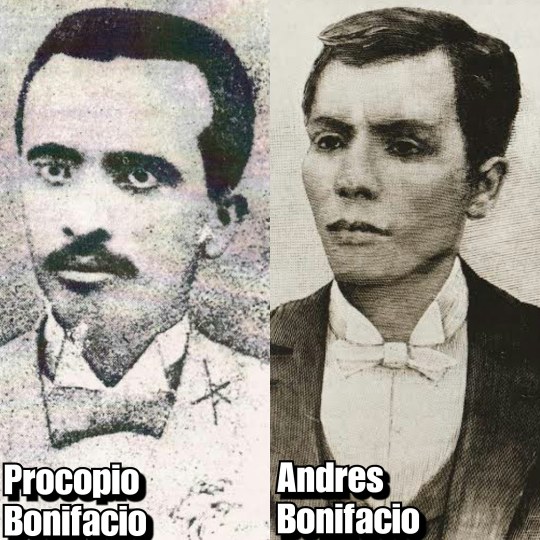
#PagArestoSaMagkapatidNaBonifacio: Noong April 27, 1897 paalis na sana sa Limbon, Indang, Cavite sina Andres Bonifaci, Gregoria de Jesus, kanyang mga kapatid at tauhan upang bumalik nang Maynila ay siya namang pagdating ng mga Magdalo ni Emilio Aguinaldo na sina Agapito Munzon at Jose Ignacio Paua. Tinanggap pa sila ng mag-asawa bilang bisita na walang kamuwang-muwang na mayroon na palang masamang pakay kanila Aguinaldo.
Kinabukasan ng April 28, 1897 muling bumalik sina Munzon at Paua upang arestuhin sina Bonifacio.
Bilang depensa lumaban ang mga tauhan lumaban ang mga tauhan ni Bonifacio sa pangunguna ni Ciriaco, dito ay nabaril si Andres sa kanyang kaliwang balikat at sinundan pa nanh saksak ni Paua sa leeg. Si Ciriaco naman ay iniwan na naghihingalo at nag-aagaw buhay
Si Procopio ay binugbog ng katakot-takot, si Oryang naman ay tinagkang pagsamantalahan no Coronel Intong o ni Munzon.
Matapos nito ang asawa ni Bonifacio at kapatid na si Procopio ay dinala sa isang bahay sa Naic (Cas Hacienda de Naic) na noo'y bahagi ng Maragondon.
Hindi binigyan ng karapatang lunas ang sugat ni Andres kung kaya't habang nililitis matinding sakit at unti-unting panghihina dahil sa dami ng dugong nawala sa kanyang dinanas.
1 note
·
View note
Text
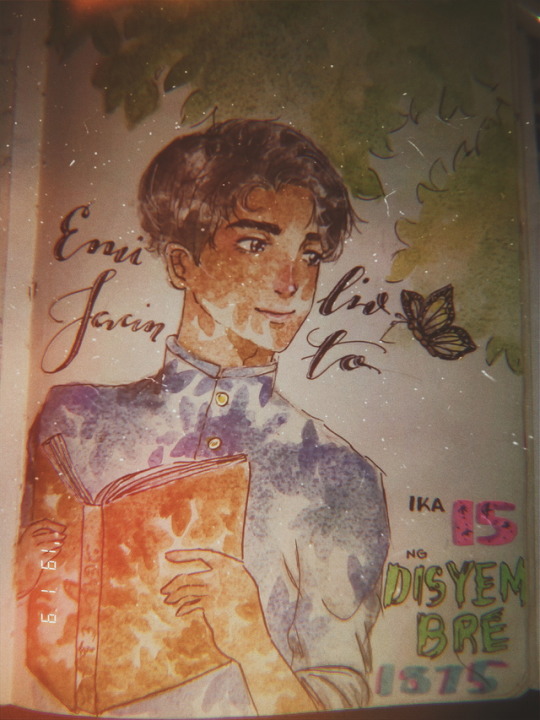
I wanted this to be my first post because this boi deserves love ❤❤💕
To be honest, he's one of the most unappreciated and unrecognized revolutionary hero here in my mother country, the Philippines.
In middle school (grade 6), our history books didn't say so much about this gwumpy boi. They're like, "Oh, him? He's just the right hand man of the Supremo, Andres Bonifacio. He wrote many things in the Katipunan blah blah." But what kind of essays? They fail to discuss his messages and they failed to discuss the Kartilya ng Katipunan's content, they failed to discuss his feminism, his respect for women. They just discussed him to be the shadow of Andres Bonifacio (Well, for my school's history books, idk about u guys.). They failed to discuss his collaboration with Dr. Pio Valenzuela and Andres Bonifacio for their first newspaper in Katipunan, the Kalayaan. His legacy slowly fades away. As I can remember, our discussions about the Philippine Revolution in grade school only highlights Emilio Aguinaldo *eye roll*, his feud with Andres Bonifacio (mah baby.), and the Spanish-American war in Manila Bay. They would talk about the death of Goyo (he deserves the credit), Antonio Luna (he deserves the credit too.), their death that took place in American Occupation, but not the death of Emilio Jacinto who died just recently when Americans came. Gurl, I was even shookt when I read about Catalina de Jesus, his wife. Like damn, no one talked about Emilio settling down to being a business man in selling meat.
I think he deserves the title, "Brains of the Revolution." because he was a secretary and an advisor to the Supremo in KKK which is the roots of the Philippine Revolution.
I have no hard feelings for Mabini, sure he's nice and smart, but he wasn't even part of the Katipunan to begin with. Even Gregoria "Oryang" De Jesus, the Lakambini, 2nd wife of Andres Bonifacio and the Vice-president of women's faction in Katipunan, appalled when the title was given to Mabini.
But, oh well, maybe "Brains of the Katipunan." ain't bad.
he deserves recognition, ok? He was the youngest to join the original era of Katipunan, calling him, "Panganay na bunso." He was just 18 when he joined and gave up his dreams for the mother country (I know many katipuneros did that too.). He deserves to be sung about.
I'm not really ranting. I admire him so much, along with Macario Sakay, Andres Bonifacio, (maybe) Pio Valenzuela, and Anacleto Enriquez.
This bb boi is my first ever post in this blog cuz he deserves it.
Luv u, Miling! ❤💕💞
:oh and yeah, I did this painting last December 15, 2018. Ironically, my mother shares the same birthdate as him. I'm so jelly, so I made him a gift at midnight.
#emilio jacinto#Philippine Revolution#Bayani#Brains of the Katipunan#HE'S A GWUMPY SINNAMON ROLL#EJ#don't u think?
17 notes
·
View notes
Photo
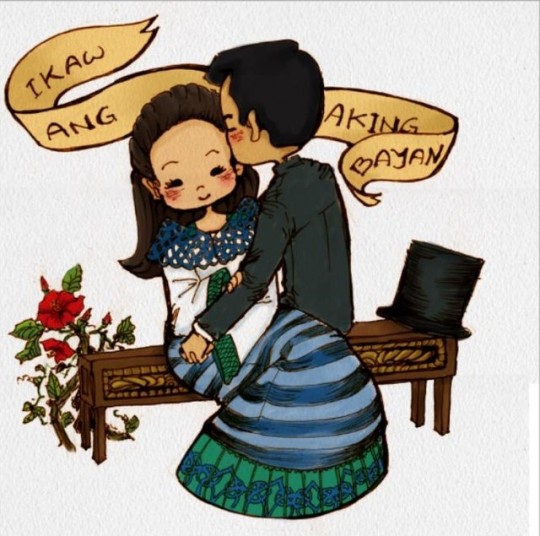
"IKAW ANG AKING BAYAN”
Gregoria: Ano ang iyong ngalan, señor?
Andres: (ngingiti sabay hahagkan ang kamay.) Maypagasa, mi corazón.
HISTORICAL NOTE: Gregoria de Jesus, aka Oryang is the second wife of Andres Bonifacio (the first being Monica of Palomar). She was 19 and Andres was 29 when they get married. First in civil wedding, and followed by a wedding infront of the Katipunan. She was a member of Katipunan under the name of “Lakambini” (muse), while Bonifacio was named under “Maypagasa”.
*hango ang quote sa taas sa historical poem ni Eljay Castro Deldoc na 'Liham ni Andes Bonifacio kay Gregoria de Jesus'
These two need more happy pictures together. Andres and Oryang forever!
12 notes
·
View notes
Text
Tales from ‘Under the Saya’
“The heart of the matter, my fellow Katipuneras, is that although there is an ongoing revolution on ground that we have to win, we also need to acknowledge the fact that we have to wage a war against our internal contradictions—a war wherein our comrades, our enemies, and even the battlefield itself, are ourselves.”
Gregoria De Jesus, “To My Fellow Widowed Revolutionaries”
Way before the first night she hid pistols and bolos underneath her saya, Gregoria De Jesus knew all too well that the further they are in the revolutionary path, the more certain death becomes for her and her husband. But when she received the news that the Supremo, together with his brother, will be executed by the Magdiwang-led government, Oryang wrote in her diary that “the news [of death], no matter how unexpected or accepted, will always find a way to catch you off guard.”
For the Lakambini, revolutionaries should view birthday celebrations as nothing but a mere exercise of decadent mestizo culture because it pits one’s time for oneself with one’s time for the collective armed struggle. However, Oryang still writes that it depresses her to think that her birthday coincides with the day she had to haggle with the Magdalo officials to know her husband’s whereabouts.
When she went to Aguinaldo’s house, the then President of the “re-established” Katipunan told her that he had first granted Andres and Procopio a pardon but he later ordered banishment instead of the military court’s decision to execute them. Contrary to this statement, Lazaro Macapagal, “the one who took [Andres Bonifacio] away and killed him”, insisted that he was ordered by the President to take the two brothers to the mountains “despite the harsh weather”, and continue with the execution. In a letter written to Emilio Jacinto, Oryang narrates the harrowing experiences that she and Procopio’s then pregnant wife, Fortuna Talampas, had to undergo in order to find their respective husbands.
Both of them had in mind already that there is no chance that they would find their husbands breathing. Even before they took their first step, this has been their mindset. Oryang writes that it’s as if they have already labelled themselves ‘widows’ even if they haven’t seen the cold corpses of their respective husbands. But at night, before they take their 4-hour sleep, Oryang states that Fortuna would almost always open the possibility, that “maybe, just maybe, Andres and Procopio [were] still alive.”
It is an absurd idea, Oryang admits, but it’s a glint of hope that they could hold onto whilst traversing that obscure trail of despair. So every time they feel their knees giving up to excruciating pain, the two would repeatedly recite their mantra: “they’re waiting for us, they’re waiting, they’re waiting for us…” And just like that, they would stand up again and continue to scour the muddy terrains of Mt. Buntis.
For almost a month, they would endure the rain and the cold sensation of their clothes that were in the state that “they would hardly burn”. There was one time when Fortuna obtained a small bag of rice, “through an act of charity,” from a merchant they met on their way. It was the most decent meal that they had. For the majority of the journey, all that they would have from breakfast to dinner were unripe bananas that they picked on their way.
In her diary, Oryang would recall the afternoon she and Fortuna went back to their hidden headquarters in Morong. She couldn’t speak a single word because her throat “has been swollen for screaming and crying and coughing relentlessly” throughout their journey, so she let Fortuna tell their comrades the sad yet expected news.
But instead of just sharing their excruciating journey and delivering the news that they did not find their husbands’ corpses, Fortuna stood on a bamboo table and called everyone’s attention. She requested all the Katipuneras—“the widowed, the waiting, and those who are still holding on”— to step forward and to listen closely to what she’d say.
“There’s a time for healing wounds,” she started. “There’s a time for grieving, and there’s a time that we have to go back to our entrensuelos and start dancing while our husbands plan for our country’s future in the backroom.”
In her diary, Oryang notes that she has yet to hear a more silent and more focused Katipunan meeting than that one. On the one hand, the silence may be brought about by the news that their Supremo has already passed away. But on the other, Oryang writes that it’s because everyone saw in Fortuna’s eyes that rebellions are, indeed, built on hope.
Fortuna continues: “Our red banner will not advance, my fellow Katipuneras, if we become complacent in just treating our comrades’ wounds, grieving for our husband’s death, and continuing to dance in our entrensuelos while our men die in the field. Yes, it is the Lord’s truth that we’re given wombs to bear future Katipuneros but we should never ever forget that we’re also given limbs, and that we can also pull out and bear these pistols and bolos hidden under our sayas.”
At this point, Fortuna grabbed the bolo on top of the table and raised it up in the air. And in the same manner as Bonifacio’s and all the other martyred comrades, she inhaled deeply and then screamed at the top of her lungs the battlecry of a true member of the Katipunan: “Hanggang kalayaan! Hanggang kamatayan!”
In that moment, Oryang was reminded that they have only been away for a month but the Revolution did not falter for a second.
16 notes
·
View notes
Text
Dalit ni Oriang
A Soundtrack of GMA's Katipunan performed by Ms. Glaiza De Castro, the song shows us the Heartaches and Pain of the Lakambini.
Sa akin ay tagubilin
Puso ko ay aliwin
Ngunit paanong gagawin?
Paligid ko ay madilim
Giliw ako'y nalulumbay
Luha ay walang humpay
Matiyagang naghihintay
Ngunit hindi mapalagay
Nagtiis ako sinta
Kahit na nagdurusa
At ngayo'y nag-iisa,
Buhay mo'y kinuha nila
Paalam sa'yo, aking mahal
Yakap-Yakap ko ang ating sumpaan
Makapiling mang muli sa kabilang buhay
At dito pa rin sa Bayang Mahal
Puso ay tumatangis
Na puno ng hinagpis
Yakap at iyong halik,
Sa aki'y ipinagkait
Payapa man o may laban
Basta't para sa Bayan
Hinding hindi ka iiwan
Puso man ay sugatan
Nagtiis ako sinta
Kahit na nagdurusa
At ngayo'y nag-iisa,
Buhay mo'y kinuha nila
Paalam sa'yo, aking mahal
Yakap-Yakap ko ang ating sumpaan
Makapiling mang muli sa kabilang buhay
At dito pa rin sa Bayang Mahal
Paalam sayo...
Aking Mahal.
4 notes
·
View notes
Text
Magmula Giliw, Nang Ikaw ay Pumanaw...
Magmula Giliw, Nang Ikaw ay Pumanaw
ni Gregoria de Jesus
Magmula, giliw, nang ikaw ay pumanaw,
Katawan at puso ko’y walang paglagyan;
Lakad ng dugo sa ugat ay madalang,
Lalo’t magunita ang iyong palayaw.
Lubhang malabis ang aking pagdarandam
Sa biglang paggayak mo’t ako’y panawan,
Alaala ako sa iyong pagdaraanan,
At gayundinnaman sa iyong katawan.
Na baka sakaling ikaw ay kapusin,
Lumipas sa iyo oras ng pagkain;
Sakit namabigat baka ka sumpungin
Na lagi mo na lamang sa aki’y daing.
Saan patutungo yaring kalagayan,
Dalamhating lubos liit ng katawan,
Magsaya’t kumain hindi mapalagay,
Maupo’t tumindig, alaala’y ikaw.
Kalakip ang wikang “magtiis, katawan,
Di pa nalulubos sa iyo ang layaw,
Bagong lalaganapang kaginhawaan
Ay biglang nag-isip na ikaw ay iwan.”
At kung gumabi na, banig ay ihihiga,
Matang nag-aantok pipikit na bigla,
Sa pagkahinbing panaginip ka, sinta
Sabay ang balong ng di mapigil na luha.
Sa pagka-umaga, marahang titindig,
Tutop ng kamay yaring pusong masakit,
Tuloy na dungawan, kasabay ang silip,
Sa paroroonan mong hirap ay mahigpit.
Matapos sumilip, pagdaka’y lalabas,
Sa dulang kakanan agad haharap;
Ang iyong luklukan kung aking mamalas,
Dibdib ko’y puputok, paghinga’y banayad.
Sama ng loob ko’y sa aking mag-isa,
Di maipahayag sa mga kasama;
Puso ko ay lubos na pinagdurusa,
Tamis na bilin mo’y “magtiis ka, sinta.”
Sa akin ay mahigpit mong tagubilin,
Saya’y hanapin at ang puso’y aliwin;
Naganap sumandaliy biglang titigil,
Alaala ka kung ano ang narating.
Mukha’y itutungo, luha’y papatak,
Katawan pipihit,lakad ay banayad;
Pagpasok sa silid, marahang igagayak
Damit na gagamitin sa aking paglakad.
Lilimutin mo yaring kahabag-habag,
Puhunang buhay tatawirin ang dagat;
Pag-alis ay sakit, paroroonan ay hirap,
Masayang palad mo sa huli ang sikat.
Ako’y lalakad, usok ang katulad;
Pagtaas ng puti, agiw ang katulad;
Ang bilin ko lamang, tandaan mo, liyag,
Kalihiman natin huwag ihahayag.
Paalam sa iyo, masarap magmahal,
May-ari ng puso ko’t kabiyak na katawan;
Paalam na nga yaring pinalalayaw,
Paalam, giliw ko, sa iyo’y paalam.
Masayang sa iyo’y aking isasangla
Ang sulam pamahid sa mata ng luha,
Kung kapusin palad, buhay mawala,
Bangkay man ako, haharap sa iyong kusa.
0 notes